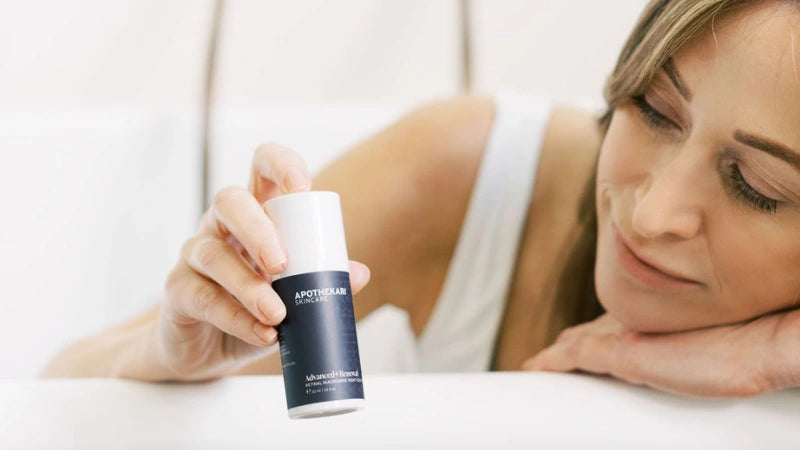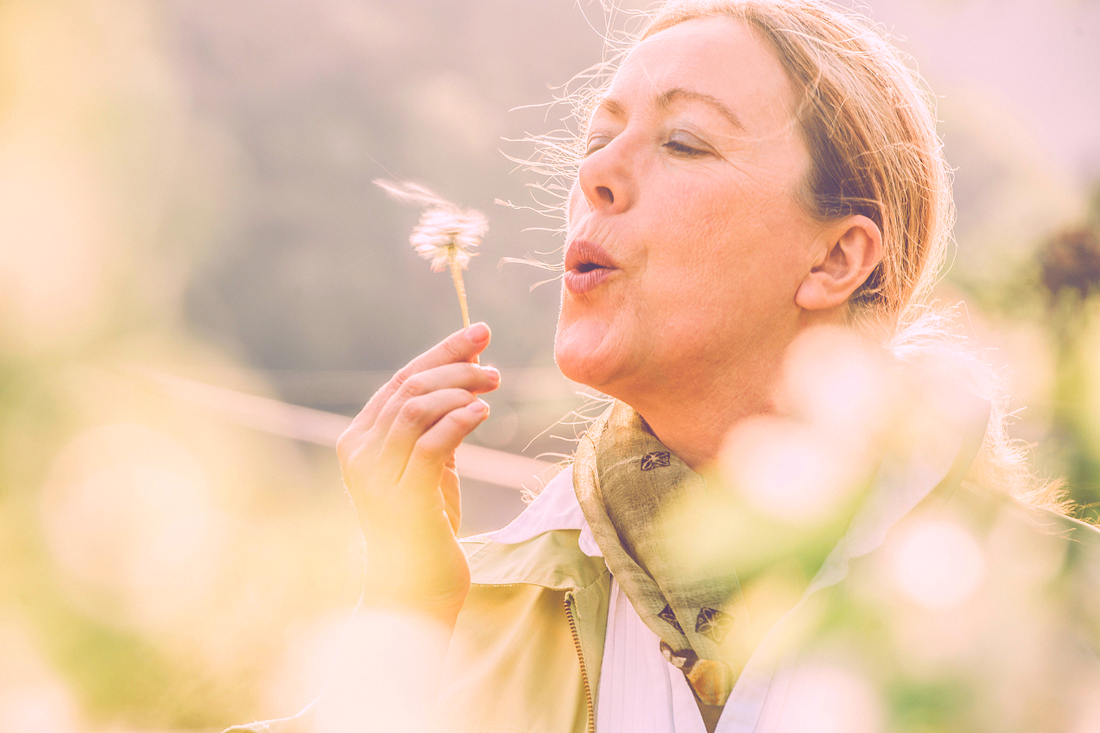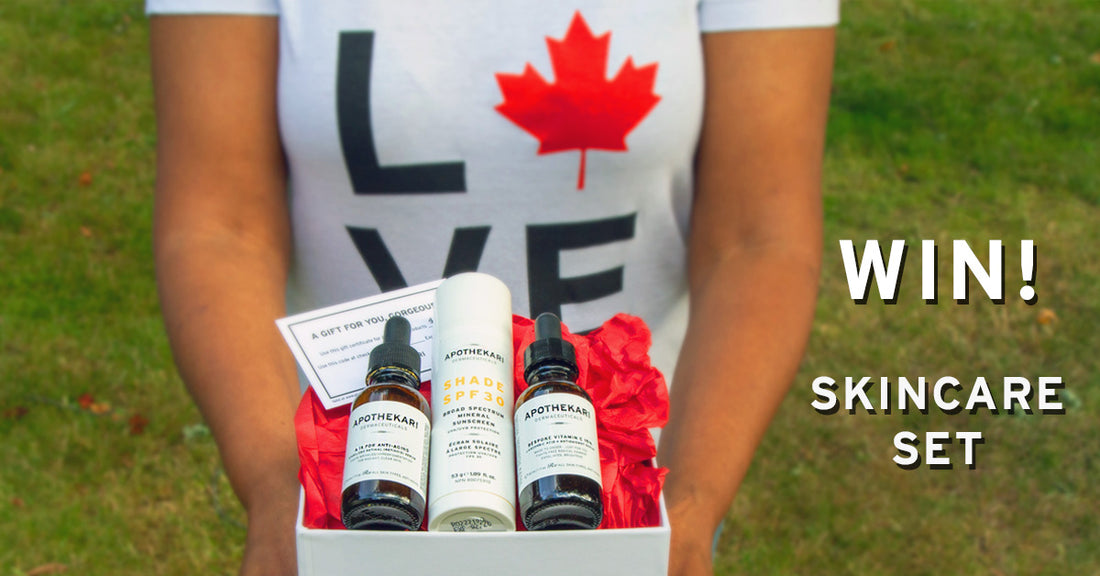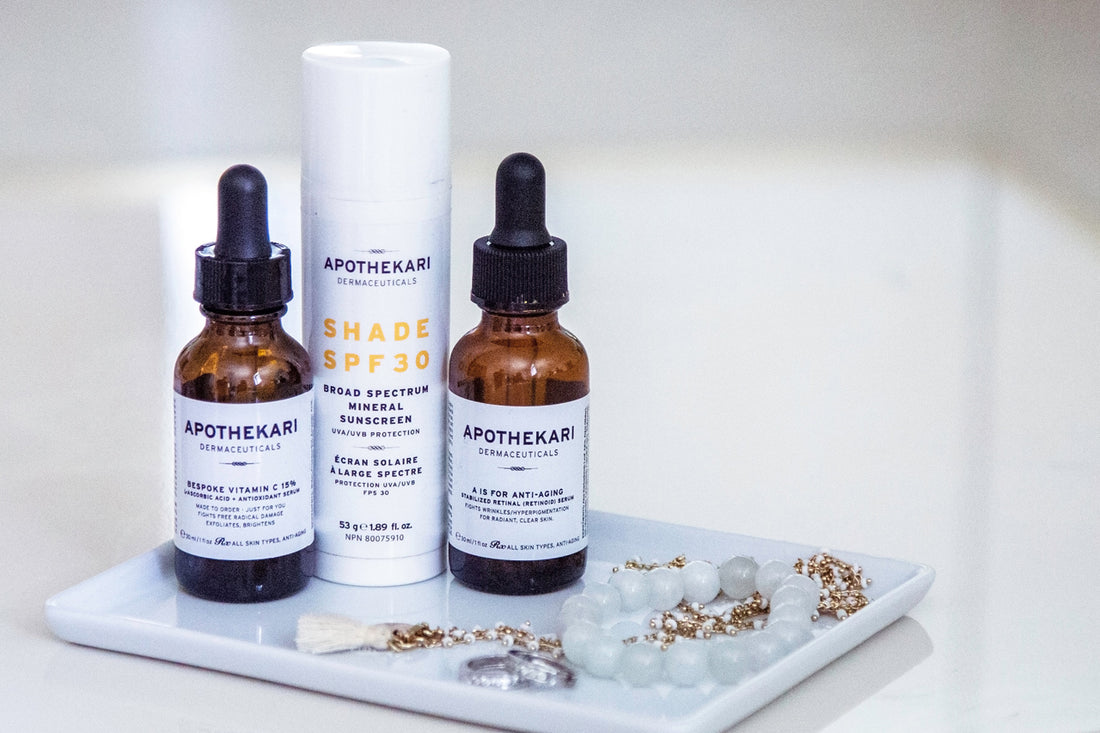Blog
Irritated Skin? Your Barrier Might Be Crying for Help
Skin suddenly acting up? Hormonal shifts can weaken your skin barrier, causing dryness, irritation, and breakouts. The fix: gentle care, deep hydration, and a simple routine to restore your glow.
Learn moreProtect Your Skin’s Collagen in Your 30s and 40s
Collagen starts to slow down in your 30s and 40s, but that doesn’t mean your skin has to lose its glow. Discover simple, science-backed steps—like daily SPF, antioxidants, and retinoids—to protect collagen and keep your skin firm, radiant, and strong. Plus, learn how skinimalism makes effective skincare easy without a 10-step routine.
Learn moreRetinol & Retinoids: Your Complete Guide
You may be wondering if retinol (or another retinoid) has a place in your skin care routine. In this post we’ll explain why it’s important if you’re serious about healthy and beautiful skin. And, we’ll show you how to get this superstar ingredient into your life. Shop A Is for Anti-Aging Serum (Our Retinoid Formulation) Shop Active Eyes What is Retinol? Retinol is a form of vitamin A that you can find in skincare serums, creams and lotions, especially those marketed as “anti-aging”. Which is NOT a term we like to use around here, but which persists, nonetheless. (It’s why we’ve recently renamed our A is for Anti-Aging Serum to Advanced+ Renewal). It belongs to a class of ingredients know as retinoids, which are known for their ability to improve the appearance of fine lines, wrinkles, and uneven skin texture. And they’ve also been shown to be useful in the management of acne. Retinol may be the most well-known retinoid, but there are several others also used in skincare. Retinyl palmitate & Retinyl acetate. Very mild and gentle and available without prescription Retinaldehyde. Potent, but still gentle and found in our Advanced+ Renewal Serum. Available over the counter. Adapalene. Prescription only. Tazarotene. Prescription only. Tretinoin. Prescription only. Isotretinoin. Prescription only. Prescription forms tend to be stronger, and often more irritating to skin. If you feel you’re ready for one, your physician will be able to guide you towards the best option for your individual needs. What is Retinol Good For? As a class of ingredients in general, retinoids: Increase collagen production and decrease its breakdown, which minimize the appearance of fine lines and wrinkles along with scarring. Inhibit the production and transfer of melanin (skin pigment), which “prevents age spots from worsening and also helps to fade existing dark spots. Help unclog pores and minimize their appearance. Increase skin cell turnover, which helps replace old, dry, dead skin cells with younger, healthier ones. The result is that glow that we’re all after. Reduce transepidermal water loss, leaving skin looking more plump and hydrated. Retinol helps to improve the appearance and texture of skin. It diminishes the appearance of wrinkles and fine lines, smooths skin, fades age spots and hyperpigmentation and minimizes acne blemishes, so it’s a powerhouse ingredient to have in your skin care arsenal. Keep in mind that while retinol may be the most well known retinoid, that it’s not necessarily the best one. As effective as it is, it does come with some effects. What are the Negative Effects of Retinol? Retinol can result in some negative side effects, especially if it isn’t used correctly. Common side effects include redness, peeling, and dryness, which can be really disheartening when you start using it on a regular basis. Boo. Another way to minimize retinoid side effects is to start with a low concentration and gradually work your way up to a higher concentration. It’s also important to use retinol in combination with a good moisturizer and/or face oil to help prevent dryness and irritation. However, despite following good instructions on retinol use, you may still find your skin unable to tolerate it. In this case, you can opt for a more gentle retinoid, like retinaldehyde. Retinol vs Retinaldehyde Retinaldehyde—often simply called retinal—is retinol’s gentler, yet even more powerful cousin. And we’re BIG fans of this ingredient at Apothekari, which is why it’s included in our Advanced+ Renewal Serum, along with other actives. Retinal is also one step closer than retinol in converting to retinoic acid, making it more readily available for your skin to put it to good use. And, just like retinol, studies have shown that it minimizes the appearance of dark spots, fine lines and post-acne scarring. The kicker? It works just as well (possibly better than retinol), and with fewer side effects. It should be on everyone’s radar! What Does Retinol Do To Your Face? Once absorbed into your skin, it works by increasing the production of collagen. This helps to improve your skin’s appearance, especially by smoothing out wrinkles and fine lines. It can also increase skin cell turnover, which is why it’s useful in reducing acne blemishes and fading hyperpigmentation (age spots, etc). Can I Use Retinol Around Eyes? The skin around the eyes is thinner than skin on the rest of your face, and so quite prone to wrinkling. You absolutely can apply retinol and other retinoids around the eye. However, it’s important to be mindful as the thin skin results in greater absorption of ingredients and also has a higher potential for irritation. Using a low concentration product–including retinoid creams specifically formulated for the eye area–is a great option. They will contain either a lower concentration of retinoid, contain a gentle retinoid like retinyl palmitate or retinaldehyde; or include encapsulated retinol. Encapsulated retinol slowly releases retinol, rather than a big burst all at once, helping to minimize skin irritation. It’s an excellent way to treat the delicate skin around your eyes, where we’ve included it in our ActiveEyes Serum (along with peptides and other actives). Also remember to take the proper precautions, including using moisturizer to damp skin and sun protection. Is Retinol Good for Acne? Yes, it can absolutely help to treating acne. Because it increases cell turnover, this pushes newer, healthier skin cells to the surface, which in turn, prevents pores from clogging. It’s not always the most effective treatment for all types of acne, and if you find that it’s not working for you, check in with a dermatologist to find a better solution. How Do You Know if Retinol is Working? As with many skincare products, the impact of consistently using retinol and other retinoids can take time. You should allow at least 4-6 weeks before deciding whether it’s making a difference to your skin. Here are some signs that it may be working for you: Improved skin texture: The increase in skin cell turnover helps to smooth out bumpy and rough skin. Reduced fine lines and wrinkles: Collagen production is stimulated, which can help to reduce the appearance of fine lines and wrinkles. Brighter, more even skin tone: Improved skin tone by reducing the appearance of dark spots and hyperpigmentation. Fewer breakouts: Retinol helps to unclog pores, which reduces the frequency and severity of breakouts. When Should I Start Using Retinol? Most skin care experts advise starting retinoids in your late twenties, when the natural production of collagen and elastin in skin begins to decline. Introducing it earlier can help to prevent the signs of aging from appearing prematurely. Can I Use It Everyday? If you introduce it into your skincare routine gradually and aren’t experiencing any negative side effects (redness, irritation, peeling) then it’s perfectly safe to use it daily. However, we find that even if you introduce retinol gradually that it may cause skin irritation, especially if you have sensitive skin. The retinaldehyde in our Advanced+ Renewal Serum is not only more effective than retinol, it’s also more gentle, making it ideal for use in all skin types. In fact, many of our customers with sensitive skin are able to tolerate Advanced+ Renewal with great success after having their skin react to any other retinoid they’ve tried. Dos and Don’ts With Retinol? Do: Start with a low concentration of retinol and gradually work your way up to a higher concentration Use retinol at night. It is highly susceptible to damage when exposed to sunlight and it may also make your skin more sensitive to sun exposure. For this reason, make sure you’re apply sunscreen every day. Use a moisturizer to help prevent dryness and irritation Use consistently and be patient. It can take several weeks to see results Don’t: Use during the day as it degrades with exposure to sunlight and may also increase your skin’s sensitivity. Use if you are pregnant or breastfeeding Use in combination with other active ingredients like alpha hydroxy acids and low pH treatments without consulting a skincare professional. It’s generally safe to use them on alternate days. Use too much. Your skin can only absorb so much. Plus, this can lead to dryness and irritation Hope you enjoyed reading this!
Learn moreHere's How to Treat Dry Skin as You Get Older
Here’s how to treat dry skin, an inevitable skin change that comes with aging. In this post, learn about ingredients and tips that will lead to softer, smoother and more touchable skin. At Apothekari, our moisturizers are one of the best ways to manage dryness from head to toe. Shop Moisturizers Why Causes Dry Skin As You Get Older? Your skin ages in two main ways: 1. Extrinsic Aging Extrinsic aging is related to the impact of the environment on your skin. This includes exposure to the sun, pollution and smoke, plus diet and lifestyle factors. Stress, sleep, exercise all contribute to extrinsic aging. Together, they can lead to skin thickening, freckles, age spots and some precancerous changes such as actinic keratosis and skin cancers themselves. The sun’s UV rays damages collagen, elastin and other elements that lead to skin that sags, stretches, and loses its ability to snap back after stretching. Mature skin may also become drier, bruise and tear more easily, and take longer to heal. 2. Intrinsic Aging Intrinsic aging is something that we can’t fight against and which occurs as part of the natural aging process: Thinning of the dermal and epidermal skin layers, resulting in a smaller supply of nutrients to the cells A decline in the production of new skin cells and skin supportive fibers (collagen, elastin, etc) A decreased ability to retain moisture A decline in levels of the hormone, estrogen. Estrogen not only stimulates oil glands, which helps keep skin hydrated, it also helps to maintain the skin’s structure. Dryness affects the skin on all of your body. This includes your face, arms and legs, plus parts of your body, you may not have considered, like your vulva and vagina. More Than Lip Service Vulvar and Vaginal Moisturizer offers fast, hormone-relief for when you experience dryness down there. What is the Best Natural Ingredient for Dry Skin? Whether skin is mature or younger, a good moisturizer is key to help treat dry skin. Moisturizers work by either providing hydration, or by helping to prevent its loss, and they contain 3 main classes of ingredients: Humectants: Help to attract moisture to the skin. Glycerin, hyaluronic acid, urea and aloe vera are humectants. Emollients: Smooth and soften skin by helping to repair cracks in the skin barrier. They prevent moisture loss. Butters, oils, esters, lipids, and fatty acids are all considered emollients. Occlusives: Work by forming a protective coating on your skin’s surface, forming a protective barrier that locks moisture in and keeps harmful particles out. They tend to be oily or waxy. Petrolatum, lanolin, beeswax, jojoba oil, and olive oil are examples. Occlusives like oils, can also be emollients. Each class of ingredient provides benefits of its own, and they’re often combined together for the best results. For best results apply them to slightly damp skin to help lock in the moisture. What is the Best Thing for Dry Skin | Top Tips Using moisturizer is an essential step in dry skin management, but there are many lifestyle changes that you can implement to help as well: Introduce Humidity. The drier the air, the drier the skin. It’s a lesson, I re-learn every time I travel to the desert-like climate in Arizona. Consider using a humidifier in the room where you spend the most time, which, for many of us, is the bedroom. Change Up Your Diet. Increasing your intake of foods rich in omega-3 fatty acids has been shown to help improve the skin’s oil production, improve hydration and minimize the signs of aging. Look for them in nuts (walnuts are a rich source), olive oil, avocados and salmon. Watch Your Alcohol Consumption. Ah yes, a glass of red wine on a Friday evening is very appealing. We’re not telling you to give it up completely, but alcohol, along with caffeine, act as diuretics that can lead to dehydration and drier skin. Up the water intake to help counteract the effect if you can. Exfoliate. No matter how much you moisturize, dry skin will stay dry without some light exfoliation. For the face, check out our AHA-Mazing Clean Cleansing Gel and our Bespoke Vitamin C Serum, which hydrates and exfoliates as well. Cleanse Gently. Harsh cleansers can strip away skin’s protective natural oils. Choose one that is gentle—the one we’ve linked to above is gentle, yet also effective. Add In An Oil. If you’re already using a moisturizer and skin is still dry, consider adding in an oil. These help to lock in the moisture delivered by a moisturizing cream or lotion, relieving dryness even further. Our Antioxidant Face Oil is a boon to drier skin on the face while our Lemon Rose Body Oil offers luxurious hydration post shower or bath. Water—but, don’t make it hot! Hot water strips away skin’s protective oils. Switch to lukewarm and stay away from hot water when you shower, bathe or wash.
Learn moreThis is How to Show Off Ageless Skin Effortlessly
Ageless skin, skin that’s healthy, radiant and beautiful, is the goal for most of us.
Learn moreBoost Collagen With This Face Serum
Boost collagen with Apothekari A is for Anti-Aging, a face serum that can help keep skin looking healthy and youthful. Shop A Is for Anti-Aging Serum (Our Retinoid Formulation) What is Collagen? Collagen is the protein most abundant in mammals and it’s behind pretty much everything holding you up right now – your bones, skin and muscle. Collagen is made up of amino acids, the building blocks of protein, which give strength and structure to tissues. This allows us to remain bendy, bouncy and generally supple. It’s one of the main components of skin but we sadly start to lose collagen as early as our twenties. Over time, this can lead to fine lines, wrinkles, sagging and loose skin. Fortunately, we can help to boost collagen levels with a combination of factors including lifestyle changes, sound nutrition plus topical treatments including this face serum, A is for Anti-Aging. Sunscreen and antioxidants are a great first defense against damage to collagen. Exposure to UV rays turns up the production of MMPs (matrix metalloproteinases), a group of enzymes responsible for the degradation of most of the body’s proteins like collagen. A well formulated sunscreen, like Shade SPF 30, along with an antioxidant treatment can help to neutralize free radicals and quash inflammation. The good news about some antioxidants, like Vitamin C and green tea, found in our Bespoke Vitamin C Serum, is that in addition to protecting against free radicals, they also protect against collagen loss and help to boost its production. Learn more about how to beat sun damage here. This Face Serum Can Help To Boost Collagen While collagen creams are available, the collagen molecule itself is too large to penetrate skin to where it’s needed, deep in the dermis layer. The better way to boost collagen is to apply treatments that contain ingredients which have been shown to stimulate the production of collagen. In addition to antioxidants, peptides plus retinoids have been shown to boost collagen production. Retinoids like prescription retinoic acid or over the counter retinaldehyde, found in our A is for Anti-Aging Serum, have been around for a while and have a lot of evidence to support their ability to boost collagen levels. They work by ‘turning on’ genes and cells that are involved in collagen production and also help to organize new and existing collagen. Over time, they can minimize the appearance of fine lines and wrinkles. The biggest downside of retinoids is their ability to cause skin irritation. That’s why we are such big fans of the retinaldehyde found in A is for Anti-Aging, which is not only effective, but also the least irritating of all retinoids. Retinaldehyde is supported by other ingredients that can help to protect and improve skin’s appearance. Lifestyle Factors Beyond protecting collagen in your body with topical treatments, there are other things you can do as well. Smoking, stress, excessive alcohol consumption and a diet high in sugar and processed food can all accelerate the loss of collagen. Consume foods high in lean protein, essential fatty acids, fruits and vegetables, which contain amino acids, anti-inflammatory and antioxidant ingredients and help create a foundation for firm skin. Don’t skimp on protein, which is needed to produce collagen. If you’re curious about whether collagen supplements can help to boost collagen levels, know that while the research looks promising, it isn’t yet conclusive. For best results, look for brands that contain hydrolyzed peptides as these are the best way for the collagen stimulating molecules to reach your bloodstream. Other nutrients such as lysine, MSM (methylsulfonylmethane) and keratin stimulate collagen and vitamin C is essential for its production as well.
Learn moreCanada Day Contest - Win! Apothekari Skincare Set
CANADA DAY CONTEST Win! Apothekari Skincare Set As a proud Canadian company (Vancouver based), we are getting into the spirit of Canada Day by celebrating with a contest! Enter for a chance to win an Apothekari skincare set on Facebook and/or Instagram*. ***This contest is now closed! Thank you all for entering and for your great comments! Congratulations to Adela Patoni, the winner of our contest!*** Prize: One lucky winner will receive an Apothekari Anti-Aging Skincare Set (Value $255) filled with essentials for healthy & beautiful skin. Learn how these products can help beat sun damage this summer. This set includes: Shade SPF 30 Sunscreen: Mineral based, non-whitening & broad spectrum sun protection A is for Anti-Aging Serum: Minimize wrinkles, brighten skin & defend against sun damage Bespoke Vitamin C Serum: Protect against free radicals, brighten skin & exfoliate $40 Gift Certificate to apply to a future Apothekari purchase. How To Enter: Our Canada Day Contest is an online contest and you can enter through Facebook and/or Instagram*. Increase your chances of winning by entering in both methods; however, only one entry is allowed for each method. Facebook Entry: Go to the Canada Day Contest post on the Apothekari Facebook page timeline. Complete 2 steps to qualify as one valid entry: LOVE the contest post, and COMMENT by telling us why you love Canada and who you will celebrate with. Instagram Entry: Go to the Canada Day Contest post on the Apothekari Instagram Feed. Complete 3 steps to qualify as one valid entry: FOLLOW us @apothekariskin, and LOVE the post COMMENT by telling us what you love about Canada and tag 3 friends. Bonus Entry: Subscribe to our newsletter at the bottom of this page for a bonus entry. This information will not be shared with any other party outside of Apothekari. Canada Day Contest Conditions: This contest is run by Apothekari Skincare (Harmani Enterprises Ltd.) Contest closes July 3, 2019 (noon, PST) No purchase necessary to enter. Maximum one entry per person per social media platform. Bonus entry for subscribing to newsletter. Participants must be 19+ and a resident of Metro Vancouver to qualify for the prize and free delivery. One (1) winner will be selected in a random draw from among all eligible entries received via all entry methods and contacted by Facebook Messenger, Instagram Direct Message or email. The winner’s full name is required before being awarded the prize. Once contacted, the winner will have 24 hours to reply and accept the prize. If the winner does not meet the contest conditions, then there will be a redraw. The winner will be announced on the Canada Day Contest Post on Apothekari Skincare’s Facebook page and Instagram account once the prize has been accepted. Prize must be accepted as awarded. No substitutions. Not redeemable for cash equivalent. The winner’s home address is required for the delivery of the prize. The value of the prize is based on the retail value of the products. The prize package is valued at $255 and contains the items in our Anti-Aging Set, outlined above. If you wish to purchase the Anti-Aging Set, visit our online store at PhaMix.com. *This contest is in no way sponsored, endorsed or administered by, or associated with Facebook or Instagram. By entering, entrants release Instagram and Facebook of responsibility, and agree to Instagram’s and Facebook’s terms of use. Apothekari Clean Skincare Formulations You’re concerned about what you put on your skin and we are too. Our clean skincare formulations are made with naturally safe ingredients that are also free from: Aluminum Baking Soda Silicone Parabens Phthalates Formaldehyde Synthetic Colourants Synthetic Fragrances SLS (Sodium Lauryl Sulfate) and SLES (Sodium Laureth Sulfate) And, Apothekari Skincare products are never tested on animals. Except the human kind, of course! Apothekari Skincare products are registered with Health Canada. Learn more about our philosophy here… Photo credit: Yasmeen Strang Photography
Learn moreAll Skin Needs These 3 Anti-Aging Products
All skin benefits from 3 anti-aging products in order to keep it looking its very best – a sunscreen, an antioxidant treatment and a retinoid. In this post, we’re diving into why these products are so important if you’re interested in maintaining healthy and beautiful skin. (This set has been discontinued. Consider our Ageless skin set instead) Shop Apothekari Ageless Skin Set Here’s How Your Skin Ages Skin ages in two main ways – extrinsically and intrinsically – discussed in detail in an earlier post. Extrinsic aging occurs as result of things happening outside our bodies – UV rays, pollution, smoking & smoke exposure as well as diet and lifestyle. These factors are the biggest contributors to skin aging and can lead to thick and coarse skin, age spots and wrinkles. They can also influence the development of many types of skin cancer. Over time, ultraviolet light can damage elastin, collagen and glycosoaminoglycans (GAGs), proteins and sugars naturally found in skin and which help to keep it firm, supple, hydrated and line free. Intrinsic aging occurs naturally over a period of years and is related mainly to our genetic make-up along with hormonal and metabolic processes. If you’re interested to know more, we’ve written a detailed post on what happens to skin at menopause . Don’t be disheartened, though. If you’ve been dealt a bad hand when it comes to your genes, a healthy lifestyle, along with the right kinds of skincare products, can help to counteract many of the effects of your genes. All Skin Needs These 3 Anti-Aging Products Preventing skin damage is one of the best things you can do for your skin in the long term. Exposure to the sun’s rays is thought to be responsible for more than 80% of skin aging and ultimately leads to skin that is saggy, less resilient, wrinkled and possibly discolored. Anything you can do to protect skin from this damage is your best insurance against the effects of aging. Additionally, products that perfect skin to correct damage or imperfections are just as important. These 3 anti-aging products are the ones backed by clinical research and years of experience as offering the most benefit to skin: Sunscreen. A sunscreen that protects against both UVA (AGING) and UVB (BURNING) rays is essential to any skincare routine. Apothekari Shade SPF 30 delivers just that in a non-whitening, mineral based (zinc oxide), non-greasy formulation. Antioxidant. Antioxidants help to protect skin from damage caused by free radicals when we’re exposed to sunlight and pollution, for example. They should be applied to skin every morning along with sunscreen because they help boost the effectiveness of one another. You can find the most widely researched antioxidant, Vitamin C (as L-ascorbic acid) plus a range of other skin beneficial antioxidants such as ferulic acid, green tea, astaxanthin, alpha lipoic acid and pomegranate seed oil in our Bespoke Vitamin C Serum, made fresh for each order. Retinoid. We LOVE retinoids at Apothekari! Retinoids are a class of ingredients that are derived from Vitamin A and which include prescription retinoic acid and tazarotene plus over the counter options such as retinol and retinaldehyde. In addition to helping boost collagen and elastic production, they increase skin cell turnover (getting new, healthy skin cells to come to the surface), reverse sun damage and minimize the appearance of wrinkles and fine lines. We are big fans of retinaldehyde, which delivers results while being one of the gentlest retinoids, making it suitable for most skin types. Retinaldehyde also has antibacterial effects, making it a useful addition to the management of acne. Find retinaldehyde in A is for Anti-Aging, where it is combined with other skin beneficial ingredients. Are you ready to up your skincare game with these 3 anti-aging skincare products?
Learn more